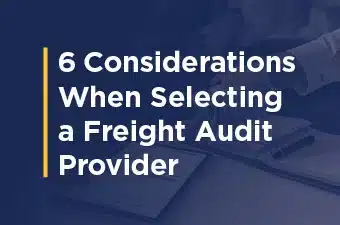- SolutionsBack to Knowledge CenterFreight Audit
6 Considerations When Selecting a Freight Audit Provider
Managing complex transportation and logistics operations requires a comprehensive strategy that encompasses every step in the process. It’s essential to implement effective auditing practices, and sometimes that means partnering with reliable freight audit providers (an added benefit is it helps to streamline your data). In this article, we’ll discuss six things to consider when selecting […]

Managing complex transportation and logistics operations requires a comprehensive strategy that encompasses every step in the process.
It’s essential to implement effective auditing practices, and sometimes that means partnering with reliable freight audit providers (an added benefit is it helps to streamline your data). In this article, we’ll discuss six things to consider when selecting a freight audit provider as part of a strategic approach to managing your transportation operations.
1. Start Small
When choosing a freight audit provider, it’s wise to start with a small initial project before implementing a full-scale audit. This approach allows you to mitigate risks and address any potential issues before they escalate. By conducting a preliminary pilot project, you can anticipate and resolve problems, ensuring a smoother full-scale implementation in the future. This step will help you make confident decisions based on real-world experience.
2. Manage Carefully
To ensure accurate and valid audit results, it’s crucial that the audit managers are fully versed in your company’s current processes and models (whether internal or external teams are used). Clear communication and a deep understanding of your business rules and practices are essential to avoid conflicts or inconsistencies during the audit process. Take the time to ensure that the audit managers have the necessary knowledge and expertise to meet your expectations.
3. Define Clearly Yet Incrementally
A successful partnership with a freight audit provider requires a clearly defined scope and schedule for each project phase. Breaking down a full-scale implementation into smaller, clearly defined phases helps to maintain focus, allows for course corrections and ensures that all stakeholders are on the same page. Clear and incremental project definitions streamline the implementation process and reduce the risk of miscommunication or confusion.
4. Require Quarterly Report Cards
Regular performance assessments are crucial for identifying potential problems before they escalate. Requesting quarterly report cards from your freight audit provider on their performance is an effective way to examine their performance and compliance against agreed-upon metrics. These check-ins will keep you informed of the audit provider’s performance, allowing you to identify areas that require improvement and address any concerns proactively.
5. Create RFPs That Capture Provider Capabilities
Detailed requests for proposals (RFPs) play a vital role in selecting the right freight audit provider. When creating an RFP, ensure that the questions you ask capture the provider’s capabilities, service propositions, data security management, financial safeguards and pricing structures in a comprehensive manner. By gathering detailed information about each provider, you can make informed decisions based on their capabilities and pricing, ultimately choosing the provider that best aligns with your specific needs.
6. Go for Global Buy-In
Implementing changes, such as a company-wide freight audit and payment function, may face resistance within the organization. To overcome this, it’s important to demonstrate the value of such a function for the overall performance and profitability of the company. Highlight how a comprehensive audit and payment system can lead to cost savings, streamline operations, and improve financial control. By gaining buy-in from stakeholders across the organization, you’ll foster acceptance and support for the chosen freight audit provider.
Conclusion
An effective freight invoice audit requires a holistic approach that encompasses all aspects of the workflow. Whether you are setting the foundation yourself, or finding a reliable partner, a solid and gradual plan is critical.
By considering these six factors during the selection process, you can establish a successful long-term relationship with a freight audit and payment service provider that aligns with your business goals and expectations. Incorporating these considerations into a comprehensive auditing strategy will help you optimize your supply chain operations, minimize waste and costs and enhance overall business performance.
Click here if you’d like to schedule a no-obligation conversation with one of our experts.
About Author:
Kevin Hunt
Vice President, Freight Audit & DataWith more than 25 years of expertise in freight invoice audit and payment, client services and carrier logistics, Kevin Hunt leads Transportation Insight’s Freight Audit and Data Services team. As Vice President of Freight Audit and Data, he provides strategic guidance to refine processes, reduce inefficiencies and help businesses gain greater financial control over their transportation costs.








On this article:
Sign up for the TI newsletter to get exclusive updates.